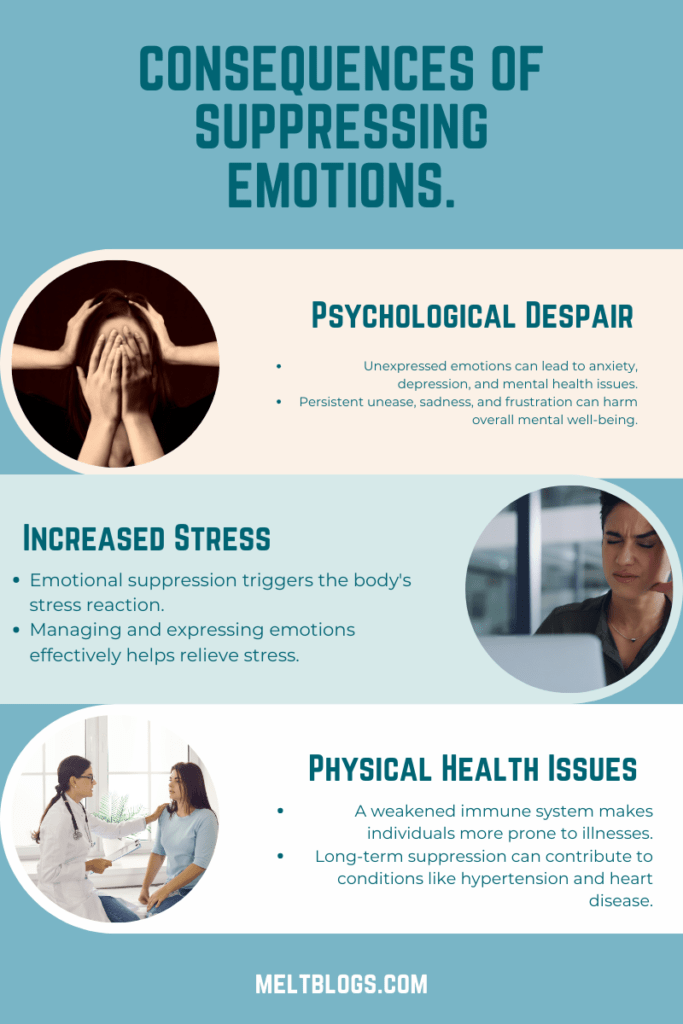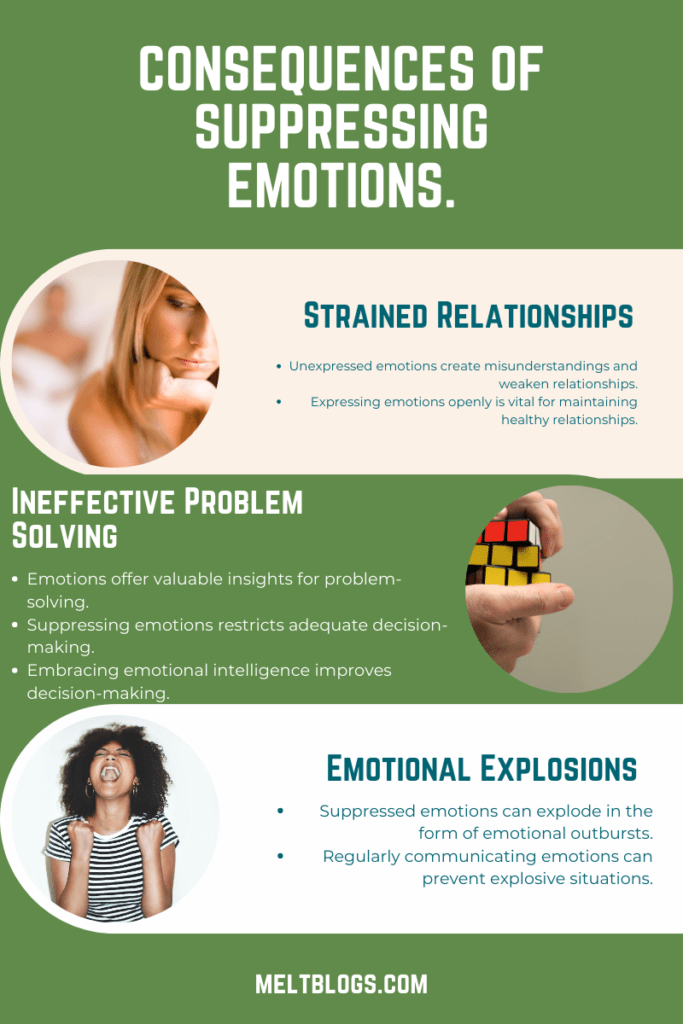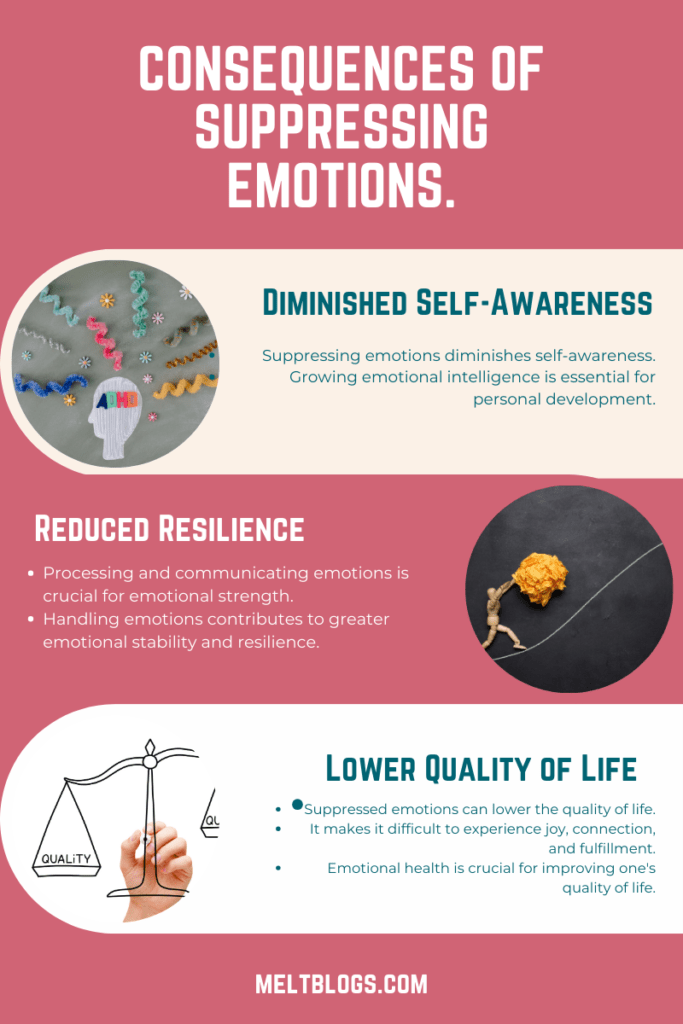What are the consequences of suppressing emotions: Suppressing emotions, while sometimes are necessary in specific situations, can have several harmful effects on a person’s mental, emotional, and even physical well-being. Here are some of the possible consequences of suppressing emotions:
Also Read:
- How to deal with emotional pain?
- How to identify energy vampires?
- Signs you are emotionally drained.
- How to accept an apology?
- Side effects of repressed anger.
- How to find inner peace?
What are the consequences of suppressing emotions
Psychological Despair
Keeping emotions bottled up can lead to increased psychological distress. Unexpressed emotions can lead to anxiety, depression, or other mental health issues over time. People may experience a persistent sense of unease, sadness, or frustration, and if these feelings are not addressed, they can boost, involving one’s overall mental well-being. It’s essential to acknowledge and address these emotions to keep good psychological health.
Increased Stress
Suppressing emotions can grow stress levels. The body’s stress reaction is triggered when emotions are not properly expressed, leading to the release of stress hormones like cortisol. Chronic stress, which often results from long-term emotional suppression, can have a detrimental impact on physical health, contributing to issues such as sleep disorders, high blood pressure, and a weakened immune system. Learning to manage and express emotions effectively can help relieve stress and its associated health risks.
Physical Health Issues
Prolonged emotional suppression has been linked to different physical health problems. The body and mind are intricately connected, and the effects of suppressing emotions can display physically. It can lead to headaches, gastrointestinal issues, and a weakened immune system, making people more sensitive to illnesses. In the long run, it can contribute to more extreme conditions like hypertension and heart disease. Recognizing the connection between emotional well-being and physical health is important for overall wellness.

Strained Relationships
Unexpressed emotions can lead to misunderstandings and weakened relationships. When people don’t communicate their feelings, it can create space and bitterness in personal and professional relationships. Partners, family members, and colleagues may struggle to understand the unspoken emotions, leading to tension and disagreement. Learning to express emotions openly and frankly is important for maintaining healthy and supportive relationships.
Ineffective Problem Solving
Emotions often hold useful information about a person’s requirements and problems. Suppressing these emotions can restrict adequate problem-solving and decision-making. When people ignore or deny their emotions, they may forget crucial understandings that could help them find solutions to different life challenges. Embracing emotional intelligence and managing feelings constructively can lead to more promising decision-making.
Emotional Explosions
Suppressing emotions doesn’t make them vanish; they can build up over time. Eventually, these hidden emotions may explode in the form of emotional outbursts, which can be damaging to relationships and mental well-being. These sudden emotional outbursts can be overwhelming and challenging to control, causing damage to oneself and those around them. Finding healthy platforms to communicate emotions regularly can control such explosive situations.

Diminished Self-Awareness
Emotions serve as signs about what is happening in our inner world. Suppressing them can lead to a diminished sense of self-awareness and an incapacity to understand one’s own requirements and wants. This lack of self-awareness can inhibit personal growth and self-improvement. Growing emotional intelligence and being adjusted to one’s feelings is essential for personal development.
Reduced Resilience
Properly processing and communicating emotions is an important part of building emotional strength. When emotions are suppressed, people may struggle to jump back from tough situations. They may find it challenging to adjust to trouble and may be more inclined to emotional breakdowns during times of stress. Welcoming emotions and learning to manage with them can contribute to greater emotional stability and resilience.
Lower Quality of Life
In the long term, suppressing emotions can contribute to a lower quality of life. People may find it more difficult to experience joy, connection, and fulfillment when their emotional landscape is dominated by suppression. Life joy and overall well-being are closely tied to emotional expression and well-managed feelings. Acknowledging the importance of emotional health in improving one’s quality of life is crucial.




